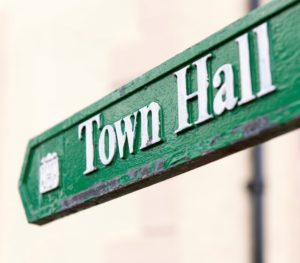How to Become an Adaptable and Effective Local Government
 Local government offices manage a wide variety of citizen services and needs. If you’ve ever taken a trip to your local government offices, you will most likely have seen that they were bustling with activity. It’s a place where citizens expect to see effectiveness and efficiency in action, as local government leaders should always be good stewards of the community’s tax dollars.
Local government offices manage a wide variety of citizen services and needs. If you’ve ever taken a trip to your local government offices, you will most likely have seen that they were bustling with activity. It’s a place where citizens expect to see effectiveness and efficiency in action, as local government leaders should always be good stewards of the community’s tax dollars.
With so many tasks to complete every day – and every week – some local government employees may have an inclination to do things the way that they’ve always been done rather than look for new and innovative ways to save the government time or money.
To truly be effective, every local government leader must be adaptable to the most recent environmental and societal changes. Local government employees would be remiss not to take advantage of the many opportunities that the advancement of technology is presenting in every arena, particularly as it pertains to their workplace.
Building the Local Government Workforce of Tomorrow
In 2015, the Local Government Research Collaborative (LGRC) and the Center for State and Local Government Excellence (SLGE) developed a comprehensive report that explored what the future workforce of local governments would need to do to meet the needs of their communities moving forward.
The report is aptly titled “Workforce of Tomorrow,” and their research highlights the following six strategies that local governments should be focusing on to build up their future workforces:
- Reinvent human resources to become more flexible, nimble and strategic. Seek staff who champion people management issues and who can set the workforce agenda.
- Revamp antiquated policies and practices to meet the needs and expectations of a changing workforce.
- Build a brand that tells a great story of public service.
- Focus on talent management, leadership development and succession planning to prepare for workforce transitions, build capacity and grow future leaders.
- Create a culture that values and engages employees in meaningful ways.
- Leverage technology, data and automation to improve operations and provide employees with the tools they need.
Practices for Effective Local Government Leadership
Another organization that’s done extensive research on practices for effective local government is ICMA, an organization that works toward advancing professional local government through leadership, management, innovation and ethics. In a December 2015 publication entitled “6 Strategies to Build the Local Government Workforce of Tomorrow,” ICMA identifies and explains 14 areas that local governments can focus on to improve leadership at the local government level. Here’s a snapshot of their findings:
-
Personal and Professional Integrity
Leaders and managers in local government should display ethical behavior in their official duties and personal affairs and act in a manner that demonstrates that they can’t be improperly influenced. Their decision-making should reflect integrity, honesty and openness. They should hold government staff accountable, instill accountability into operations, and communicate ethical standards and guidelines to others.
-
Community Engagement
Leaders should advocate for the community with other government bodies, engage the public in policy-making, promote civility, seek diverse input, and help the staff and the community understand the government’s direction and vision. Managers should be mindful of elected officials’ perspectives, respect the community’s history, engage with key stakeholders in the community, promote positive communication, and seek technology that promotes open dialogue between government and citizens.
-
Equity and Inclusion
Local government workers should create an environment for people from all backgrounds and areas of expertise that encourages involvement, respect and talent, and fosters the connection of diverse ideas throughout the community and the local government. Government workers should be inclusive and equitable, striving to improve the quality of life for all.
-
Staff Effectiveness
Staff effectiveness refers to encouraging staff to see their daily duties within the big picture and to be innovative while being responsible. Effective staff has direction and purpose, works as a team and maintains a positive atmosphere.
-
Personal Resiliency and Development
Effectiveness in local government requires staff to model healthy lifestyles and work habits and to continually work toward personal growth.
-
Strategic Leadership
Strategic leadership entails creating and instilling a unified vision and purpose, creating a safe space in which to take risks and initiatives, building a consensus on issues, and taking an integrated approach to solving complex problems. Government leaders will need to create innovative strategies for dealing with rapid change, establish a culture that works toward continuous improvement, and encourage interpersonal competence.
-
Strategic Planning
Managers and government leaders can become adaptable and improve effectiveness by considering the whole community in their strategic planning, being clear in their purpose and priorities, and guiding the direction toward achieving goals and objectives.
-
Policy Facilitation and Implementation
In the area of policy facilitation and implementation, government leaders and managers need to focus on short- and long-term outcomes while working with all stakeholders on policies that achieve common goals. This entails building a consensus among diverse people, which requires leaders to be politically savvy in their approach to influencing results through navigating diverse relationships.
-
Community and Resident Service
Effective local government leaders discern the community’s needs and provide responsive and equitable services. All citizens should be represented equally and have physical and technological access that allows them to engage in issues. Citizens should expect a culture of transparency and have assurance that their leaders will use different approaches to address different needs.
-
Service Delivery
Citizens should be able to expect leaders to consider the components and relationships between operational areas in order to maximize efficiency. It’s important to consider how to harness positive impact and mitigate negative impact, as well as use data to improve service delivery.
-
Technological Literacy
Effective local government leaders of the future will be able to demonstrate an understanding of information technology and to incorporate it into service delivery, communications and public access.
-
Financial Management and Budgeting
Effective local government practices include implementing a long-term financial analysis and a budgetary projection that incorporates the strategic plans and reflects the community’s values and priorities.
-
Human Resources Management and Workforce Engagement
Innovative leadership in local government will consider the human resources approach to fair hiring practices that consider trust, inclusiveness, transparency and succession planning.
-
Communication and Information Sharing
Effective leadership requires effective communication. Leaders should encourage a healthy flow of ideas, information and understanding, which factors in verbal and nonverbal communication. Leaders should be able to demonstrate poise and composure in times of crisis.
Several of the strategies and practices speak about the importance of utilizing technology to create efficiency and effectiveness. iCompass designed board portal technology specifically for this purpose. Meeting Manager is a software program that helps to streamline meetings. The program integrates seamlessly with Video Manager, which enables the public to view council meetings online. Board Manager is a program that automates much of the process for managing government boards and commissions. All of these digital software solutions promote adaptability and effectiveness in local government. Governments can easily budget for the cost of implementing the software because it offers a greater savings in time and materials, which is a true by-product of efficiency.


